Summer 2012
Published: 05/11/2012
Greetings from the Chair
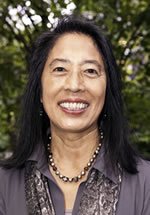 |
| Photo: Sheri Mizumori |
In the past year, the Psychology Department made major progress toward a very exciting future, despite the recent economic challenges. This was made possible because of the adaptive and visionary actions on the part of our entire team of faculty, students, and staff. Faculty have shown creative solutions in the laboratory and in the classroom when budget cuts were at their peak. They continued to receive impressive grant support for research that has important impact on our community as well as the advancement of science and knowledge. The high quality and energy of our graduate and undergraduate students has not faltered; in fact some students have worked together with faculty to create new opportunities for advancement in the classroom and in research. The quality of our staff is beyond exceptional as they have continued to provide outstanding support for faculty and students. In fact our department administrator, Michele Jacobs, was nominated for the prestigious University of Washington Distinguished Staff Award. Thus, the strength and dedication of our entire Psychology family has resulted in the following notable advances this year.
We continue to develop new mechanisms that enable our research findings to quickly impact a broad range of issues of concern to the local community. This year’s series of three Edwards Public Lectures on ‘Understanding Brains and Behavior’ described how brain science and behavioral analyses combine to provide new insight into the biological underpinnings of behavior - insights that can spawn new treatments for behavioral disorders. These lectures are free to the public, and this year we experienced record breaking success in terms of audience attendance. Psychology Professor Wendy Stone (Director of the Autism Center) brought autism research directly to the public for discussion. Our Center for Child and Family Well Being launched a successful series of “Research to Real World” workshops that bring together community leaders and researchers to discuss solutions to some of the most pressing issues facing our children. Professor Yuichi Shoda continued to spearhead our department’s collaborative effort to bring world renown researchers of childhood learning in direct conversation with parents, teachers, and administrators of the Evergreen School. A number of our faculty also demonstrated how psychological science is directly relevant to youth. Also featured in this issue is an example of how a long time supporter of our department has helped to bring our research and professional expertise to bear on specific issues of concern to the Makah tribe.
Psychology is an inherently interdisciplinary science since multiple factors are known to impact behavior. I am very excited to announce that we hired three fabulous new faculty who not only build on existing strengths of our current clinical and developmental areas, but they will also significantly enhance our ability to build new bridges to interested research groups across campus. Generally speaking, Drs. Shannon Dorsey and Katie McLaughlin are interested in issues related to child trauma from social, developmental, cognitive and neuroscience perspectives. Their work is expected to have direct impact at the local, national, and global levels. Dr. Kristina Olson studies social influences on cognitive development, especially as related to social attitudes as a function of social class. Future newsletters will provide more details about each of our new faculty members as they arrive at the University of Washington.
It is exciting that this year we were able to grow our undergraduate program. We enhanced the already wide array of courses available to both psychology majors and nonmajors, in part by hiring two award winning full time lecturers, Drs. Debra Chun and Ann Voorhies. New courses were added and we were able to offer existing courses more often. The Psychology Department Honors Program (led by Dr. Miriam Bassok) places students into active research settings, and the number of student in the Honors Program grew to an all time high! Psychology also continued to offer the largest number of research credit hours compared to any other departments on campus. It is thrilling to see our students put into practice knowledge gained in the classroom. In this newsletter we feature some of the individual successes of our undergraduate students.
It has been a thrilling year, and I very much look forward to seeing continued growth next year. Until then, I hope you and yours have a wonderful summer!
Best wishes
Sheri
Featured Articles
Fear and Pooh at Paws-on Science
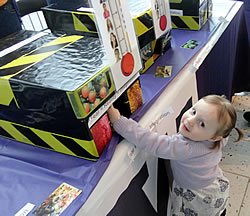 |
| Photo: A brave toddler explores Associate Professor Lori Zoellner’s booth on fear at PAWS on Science at the Pacific Science Center. |
Two Psychology Department research labs participated in the UW Paws-on Science event at the Pacific Science Center on March 30-April 1, 2012. Close to 10,000 people attended the three-day outreach event which showcased almost 50 UW research groups.
Associate Professor Lori Zoellner and her research team from the Center for Anxiety and Traumatic Stress (UWCATS) engaged kids and parents in an exercise about emotional and physical responses to fear. Center’s staff members Frank Farach, Travis Dennison, Janie Jun, Libby Marks, Helen Kinsel, Alissa Jerud, Jon Poquiz, and Larry Pruitt operated the booth over the weekend. The goal was to demonstrate how environmental information is used to make judgments and form expectations about ambiguous situations, and that fear is a combination of both reality and imagination. Kids and parents participated in a demonstration in which they were instructed to reach into a “mystery box” and guess, by touch alone, what was inside. Each box had fear-evoking pictures (e.g. a reptile bearing its teeth), on the front, while a non-fearful, but related object (e.g. a toy reptile), was placed inside. Visitors rated their fear levels before reaching into each of the boxes, which were discussed at the end of the exercise.
Center staff discussed how fear is an adaptive emotion, and that in ambiguous situations people often err on the side of caution (e.g. being anxious or afraid). The body’s response to fear was also discussed (e.g. feeling your heart race), as were the learning processes involved. Staff members explained that these processes are universal, and described how these fearful interpretations of ambiguous situations can be especially problematic for individuals who have gone through traumatic experiences, as is the case for individuals suffering with posttraumatic stress disorder (PTSD). For those that were interested, information was available about PTSD and no-cost PTSD treatment options through a National Institute of Mental Health-funded research study going on at UWCATS.
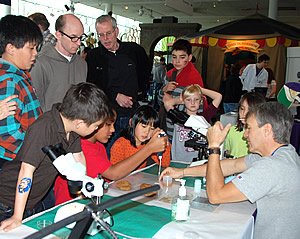 |
| Photo: Professor Randy Kyes (rt) providing exhibit demonstration during the UW Paws-on-Science event |
Psychology Professor Randy Kyes and the affiliated Center for Global Field Study also participated in this event. The Center’s exhibit “Animals and the Future” allowed children to learn about some of the methods used to study animals in the wild and practice with some of the actual research equipment and techniques used in the field. These included radio telemetry, GPS, trap cameras, and biological sample collection. The exhibit demonstrated the close relationship between humans and the environment and how animals can provide the first indication of future environmental impact and global health issues. One of the exhibit activities that was a real hit involved a hands-on demonstration of primate fecal sample collection to look for intestinal parasites. As Center Director, Professor Kyes noted that no real fecal samples were used, but that the fake "pooh" attracted a lot of interest.
Grad School 101
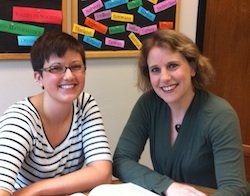 During fall quarter 2011, Psychology advisors Vicky Hansen and Tracy Maschmann Morrissey led a group of psychology majors and alumni through a ten week class that focused on the graduate school application process - a kind of boot camp for students planning to apply to psychology related graduate programs. Offered as a two credit elective class for the first time last fall, the idea came about six years ago and initially took the form of a kind of going to grad school support group.
During fall quarter 2011, Psychology advisors Vicky Hansen and Tracy Maschmann Morrissey led a group of psychology majors and alumni through a ten week class that focused on the graduate school application process - a kind of boot camp for students planning to apply to psychology related graduate programs. Offered as a two credit elective class for the first time last fall, the idea came about six years ago and initially took the form of a kind of going to grad school support group.
"I had noticed that many students were coming into our office to ask the same questions about searching for graduate programs and preparing a strong application," says advisor Vicky Hansen. During its first few iterations, the group met voluntarily, with a loose agenda. It is now a full-blown class that includes writing assignments and ample opportunities for student interaction and reflection. Guest speakers include Psychology faculty, graduate students, and UW career counselors.
Open for credit to UW students, the class is also accessible for our Psychology alumni. "We like to keep the doors open to our alumni and other community members who may want to participate in this process," says Vicky. Student response and feedback has been very positive, and another class is on the books for this coming fall quarter.
Distinguished Staff Award Nomination - Michele Jacobs
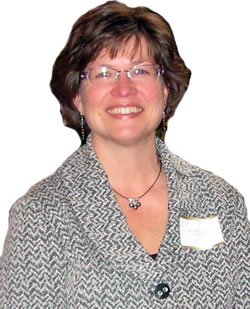 |
| Photo: Michele Jacobs |
Our Departmental Administrator ‘extraordinaire’, Michele Jacobs, was nominated for the 2012 UW Distinguished Staff Award. Along with other nominees, she was honored at a campus-wide reception this past February. Since 2003, Michele has continued to provide day-to-day operational oversight, management and support for fiscal, administrative, academic, technical and computing, and personnel functions of the Department of Psychology. In addition, Michele develops policies and procedures that insure departmental compliance with federal, state, local, and university rules and regulations for research and instruction. She also closely oversees major construction and renovation projects in coordination with UW Capital Projects Office, architects, and contractors. Further, Michele insures that the department’s research facilities meet federal and university standards, and this has allowed our facilities to be nationally accredited.
In a large department such as ours, the above tasks are individually monumental not only because of the number of people involved, but also because it is necessary for the functions of each staff group to be integrated within the context of the department’s strategic goals. The latter requires a special leadership style, one that Michele has mastered exquisitely. Michele also serves on a number of campus-wide committees that determine university administrative policies, and that seek to improve efficiencies in different administrative domains. Her ability to seamlessly integrate the many facets of her job provides a strong, dynamic, and goal-directed scaffolding for everyday life in the department. This framework, together with her encyclopedic knowledge of departmental facts, figures, and policies, makes Michele an invaluable resource for almost every major administrative decision. It is wonderful that Michele was recognized for all that she does for us. Congratulations, Michele!

